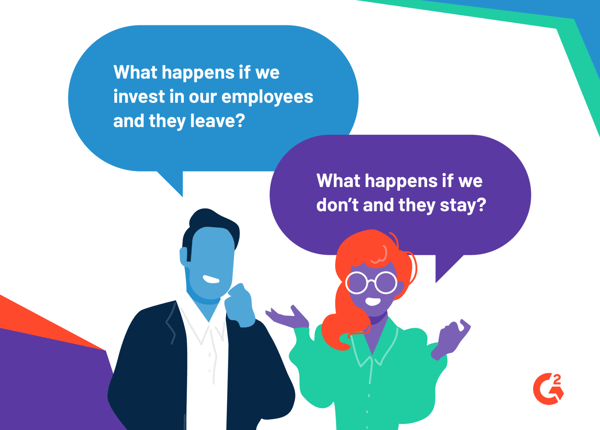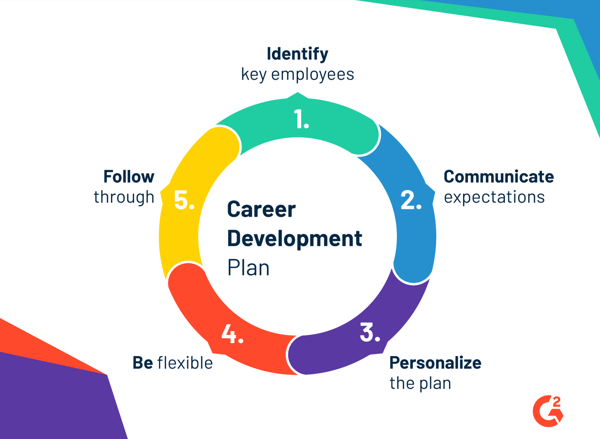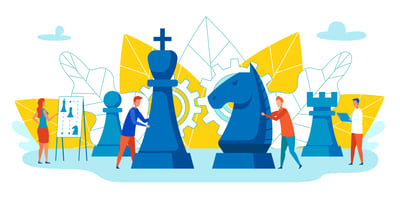
The greatest investment you can make isn’t in fancy new technology or high-profile acquisitions but your own workforce.
As your company grows, your employees should grow with it. With the job market as competitive as it is, it’s more important than ever to reinvest in the people who helped you achieve success in the first place. One of the most popular ways to do this is by creating and implementing a career development plan for your employees.
If you’ve never used a career development plan before, you should first get familiar with what it entails and how it fits into your overall talent management strategy.
A career development plan is a personalized strategy to assist employees in achieving their career goals. A career development plan consists of short-term and long-term goals related to an employee's job, incorporating their strengths and future career aspirations.
An easy way to discover which of your employees want to prioritize their career development is through a self-assessment or an employee satisfaction survey. Asking specific career planning questions during a survey can provide invaluable insight into what your employees are really after.
Here’s a dirty little secret about the current state of employee happiness – 26% of employees feel undervalued in their current position. That's a large portion of the workforce that doesn't feel as though they're being heard.
Those feelings of not being appreciated can have serious consequences. The second most popular reason employees give for quitting their job is lack of professional development and opportunities for growth.

What could be worse than unhappy employees leaving your company? How about unskilled employees sticking around? Unskilled and unmotivated workers can wreak havoc on your company culture, revenue stream, and overall office morale.
It’s time for companies to stop holding their employees back for fear that they’ll leave for a competitor. Investing in your employees’ career development will not only keep them around longer and help your retention efforts, but it’ll also make them better at their jobs.
It might seem daunting to create a new corporate program from scratch, especially if you've never done it before. But the great news is that creating a career development plan isn't as daunting as you might think.
Once you create a system or a starting point that the management and the C-Suite can agree on, a career development plan can be rolled out to every team and department!
Here's an easy-to-follow five-step action plan to get you on your way.

The first step you’ll want to take is identifying a list of employees who’re ready for the next step in their career. These are your high-performers or employees who have shown a great deal of potential.
You can enlist the managers of each department to help you tap those who will benefit the most from a career development plan.
Not all of your employees will be ready for a professional development plan. Those underperforming or not meeting expectations may benefit more from a performance improvement plan and improved focus on their current competencies before moving onto a career development plan.
Once you have a list of employees you should be focusing on; it’s time to create a tailored career development plan to fit each of their needs.
Once you’ve created a list of employees ready for some personalized career planning, you’ll want to alert them of the process. Start by sending the employee an email or scheduling a quick fifteen-minute meeting to go over your plans for their employee development plan.
This first meeting should not be an in-depth meeting where you review everything with the employee. You should set a more in-depth, follow-up meeting for a week or two after your initial contact to give both yourself and the employee time to prepare.
During this first meeting, you should recommend ways to prepare for your employees’ career development plan.
Some questions you should ask your employee could be:
Think of this first meeting as more of a courtesy heads-up or a pre-meeting to get them thinking about what topics they’d like to cover regarding their career path.
The most important thing you need to keep in mind when creating a career development plan is personalizing it for each employee.
Start by determining what professional and personal goals you think will help each employee reach their full potential. These should be tailored to their current position and experience level.
Here are some professional goals you can highlight for your employees:
You will be dealing with employees from different backgrounds, skill levels, and career aspirations, which means no plan will work for the same two people.
Tip: Professional goals and objectives are crucial for a successful career development plan.
All the planning in the world can’t prepare you for an employee walking into your meeting and deciding they want to take their career in a different direction. Don’t panic! An employee who has done enough thinking to decide they want to take their career in a different direction is still someone you can work with.
If you have an employee who wants to switch career paths, teams, or departments, you may need to loop in management from the department they hope to change to and get their input.
You should come prepared with a list of ideas and career development goals that are generic enough that they will help anyone with their career planning. For example, leadership courses, writing workshops, etc. This way, you can continue with your career planning process while you restructure your plan to fit the employee’s career aspirations.
Once you and the employee decide on their career development plan, it’s time to get things moving. Offer and maintain an open-door policy where employees can come to you to discuss ideas they have for their career development.
You are a resource for them to explore what interests them on their path to career growth. In addition to an open-door policy, plan on meeting with your employees every quarter to discuss the progress of their plan.
It’s essential to track the progress of employees who take their career development plan seriously and ensure that the right managers know about their progress. While you cannot promise a promotion or a raise to an employee for their participation in a career development plan, you can let the right people know that they deserve one!
If you don’t have a system for tracking the progress of a career development plan for your employees already, you may consider investing in career management software.
An individual development plan is a career development program that helps employees with professional and personal development. It focuses on both short-term and long-term goals for employees to improve their current role while learning new skills and advances them to the next level of career development planning.
IDP offers employees numerous development opportunities. It's a recurring process, not just a one-time performance review activity that aligns the HR department with employees and promotes a healthy relationship between the two.
The main focus of IDP is to leverage the mentoring from the human resources to the employees who want to achieve some measurable and smart goals related to their current job.
Many organizations mandate IDPs while they onboard their employees or conduct it as an annual activity for their employees. A clear individual development plan helps communicate the vision, mission, goals, and expectations.
With IDP, HR can understand employees’ strengths, weaknesses, and development needs and give them time and space to focus on their career and personal development.
“Opportunity is missed by most people because it is dressed in overalls and looks like work.”
Thomas A Edison
American inventor and businessman
Just as there are best practices for creating a career development plan, there are also some things you should avoid doing.
You should make it crystal clear to your employees that any career development plans or reimbursements are contingent on budget and ability. You may be in a different spot nine months from where you are now and don’t want to make any promises you can’t keep.
Instead, focus on short-term goals they can strive to hit that show they're serious about career advancement. This gives your employee something tangible they can work on while allowing you the flexibility to change course should future plans change.
Your job as an HR professional is to empower your employees to take their careers into their own hands – not to do the work for them. Allow them to take charge of how their career planning will unfold and act as a resource for them.
Your job isn’t to find seminars and workshops for the employee but rather to advocate on their behalf with their manager to allow them to attend. This is also a good test of which employees want it. An employee that is focused on career advancement won't need hand-holding to get the job done.
You don’t want to create any formal documentation or contract regarding career development because you don’t want to violate any of your state’s HR laws unknowingly.
Think of this process as more of career guidance than a formalized process. You are the counselor and advocate acting on behalf of your employees. You should be very careful not to promise any promotions, raises, or career opportunities to an employee during this process.
Ultimately, the goal of a career development plan is to create a space and opportunity for your employees to thrive. Let them lead with curiosity and explore new paths for themselves. You might be surprised what you learn along the way!
Ready to put it all together? We've got you covered. Download your free career development plan template.
Lauren Pope is a former content marketer at G2. You can find her work featured on CNBC, Yahoo! Finance, the G2 Learning Hub, and other sites. In her free time, Lauren enjoys watching true crime shows and singing karaoke. (she/her/hers)
Your employees are craving growth opportunities – how are you answering the call?
 by Lauren Pope
by Lauren Pope
The MVP of your company just put in their two weeks notice – do you have an internal candidate...
 by Lauren Pope
by Lauren Pope
What do you and your career path have in common? You’re both unique!
 by Lauren Pope
by Lauren Pope
Your employees are craving growth opportunities – how are you answering the call?
 by Lauren Pope
by Lauren Pope
The MVP of your company just put in their two weeks notice – do you have an internal candidate...
 by Lauren Pope
by Lauren Pope


